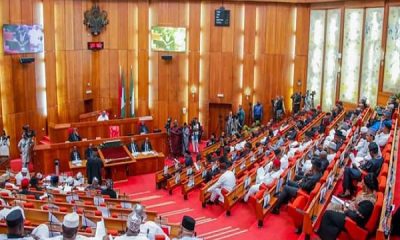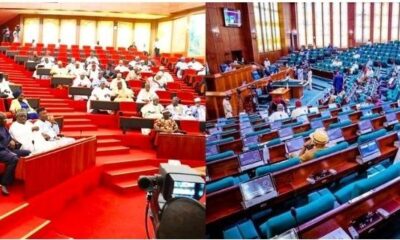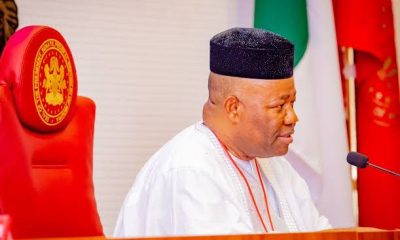Headline
Senate Plans Law Making Electronic Transmission Of Results Mandatory

Ahead of the 2027 elections, the Senate is set to amend the Electoral Act to allow for diaspora voting, at least for presidential elections, to enable citizens, especially those on essential service abroad, to vote.
The Senate in a communiqué issued at the end of its retreat in Ikot Ikpene, Akwa-Ibom State, also resolved to make electronic transmission of results mandatory from the next general elections in 2027, including the uploading of polling unit-level results and result sheets used at different levels of result collation.
Sunday PUNCH reports that in events preceding and after the election that brought President Bola Tinubu into power, there were a lot of agitations to allow Nigerians abroad to take part in the elections.
Also, a number of Nigerians called for the electronic transmission of results from the BVAS machine.
The Senate noted that it was necessary for the Independent National Electoral Commission to be unbundled to improve its efficiency and effectiveness in the preparation and conduct of elections.
The communiqué stated, “Relating to the use of technology in elections, remove the ambiguity evident in Section 64 of the EA22. Also, make electronic transmission of results mandatory from the next general elections in 2027, including the uploading of polling unit-level results and result sheets used at different levels of result collation.
“Introduce diaspora voting, at least for presidential elections, to enable citizens to vote, especially those on essential service abroad, such as military, paramilitary, and other security personnel abroad, Embassy staff, and other citizens.
“Relating to political parties; stipulate sanctions for failure to submit the register of party members not later than 30 days before the date of party primaries, congresses, or conventions in relation to Section 77(3) EA22, which the political parties have observed in the breach in the 2023 elections without penalty.”
The 10th Senate further noted that it was time to develop and enact a comprehensive national security strategy that outlines the nation’s security objectives, threats, and policy priorities.
The Red Chamber added that such a strategy could serve as a guiding framework for legislative action in the security sector.
Headline
EFCC bars dollar transactions, orders embassies to charge in naira

The Economic and Financial Crimes Commission has barred foreign missions based in Nigeria from transacting in foreign currencies and mandated them to use Naira in their financial businesses.
The EFCC has also mandated Nigerian foreign missions domiciled abroad to accept Naira in their financial businesses.
The anti-graft agency said the move is to tackle the dollarisation of the Nigerian economy and the degradation of the naira
The Commission, therefore, asked the government to stop foreign missions in Nigeria from charging visa and other consular services in foreign denominations.
The EFCC gave the advisory in a letter to the Minister of Foreign Affairs, Amb. Yusuf Tuggar, for onward transmission to all foreign missions in the country.
In the letter, the EFCC said it issued the advisory because the practice of paying for consular services in dollars was in conflict with extant laws and financial regulations in Nigeria.
In a letter dated April 5, 2024, which was addressed to the Minister of Foreign Affairs, Ambassador Yusuf Tuggar, titled: “EFCC Advisory to Foreign Missions against Invoicing in US Dollar,” the EFCC Chairman, Ola Olukoyede expressed dismay over the invoicing of consular services in Nigeria by foreign missions in dollars.
The EFCC cited Section 20(1) of the Central Bank of Nigeria Act, 2007, which makes currencies issued by the apex bank the only legal tender in Nigeria.
The letter read, “I present to you the compliments of the Economic and Financial Crimes Commission, and wish to notify you about the commission’s observation, with dismay, regarding the unhealthy practice by some foreign missions to invoice consular services to Nigerians and other foreign nationals in the country in United States dollar ($).
“It states that ‘the currency notes issued by the Bank shall be the legal tender in Nigeria on their face value for the payment of any amount’.
“This presupposes that any transaction in currencies other than the naira anywhere in Nigeria contravenes the law and is, therefore, illegal.”
The commission further stated that the rejection of the naira for consular services in Nigeria by certain missions, along with non-compliance with foreign exchange regulations in determining service costs, is not just unlawful but also undermines the nation’s sovereignty embodied in its official currency.
The letter continues: “This trend can no longer be tolerated, especially in a volatile economic environment where the country’s macroeconomic policies are constantly under attack by all manner of state and non-state actors.
“In light of the above, you may wish to convey the commission’s displeasure to all missions in Nigeria and restate Nigeria’s desire for their operations not to conflict with extant laws and regulations in the country.”
Diplomatic sources said yesterday, May 10, that some embassies were wondering whether the EFCC’s advisory represented the position of the Federal Government.
Headline
Prince Harry visits sick Nigerian soldiers in Kaduna

Prince Harry and his team visited the 44 Nigerian Army Reference Hospital in Kaduna to interact with wounded soldiers who are receiving treatment.
The Duke of Sussex is in Nigeria with his wife to champion the Invictus Games, which Harry founded to aid the rehabilitation of wounded and sick servicemembers and veterans.
Nigeria joined the Invictus Community of Nations in 2022 becoming the first African country to join.
Prince Harry’s visit to Kaduna came 68 years after his late grandmother Queen Elizabeth II visited the state during the time of the late Premier of Northern Region Sir Ahmadu Bello.




-

 Business5 days ago
Business5 days agoNigeria needs over $2bn to revive Ajaokuta Steel Plant, says Minister
-

 Headline5 days ago
Headline5 days agoSuspend cybersecurity levy– Reps to CBN
-

 Entertainment3 days ago
Entertainment3 days agoAMVCA Cultural Day: BBNaija’s Neo, Venita win Best Dressed Male, Female
-

 Headline3 days ago
Headline3 days agoPrince Harry visits sick Nigerian soldiers in Kaduna
-

 News5 days ago
News5 days agoShan George’s money returned to Zenith Bank account
-

 Metro3 days ago
Metro3 days agoEx-Sports Minister laments after hospital neglected him for hours over N80000 deposit
-

 Headline5 days ago
Headline5 days agoTinubu resumes work after foreign trip









